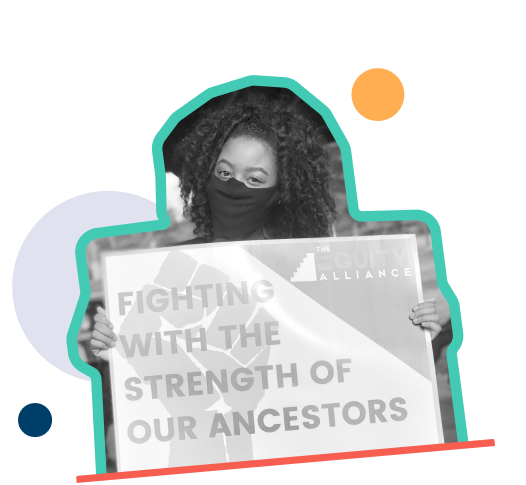Rurality, Poverty, and Race
On September 26, Hurricane Helene made groundfall - hitting northern Florida at peak intensity and imparting deadly and devastating destruction over 48 hours on its 500 mile path across the Southeast. This part of the country is, as we know, all too well acquainted with climate disasters, particularly the increasingly destructive hurricanes that come toward the end of each summer. What might not be as well known is that this part of the country - from the Mississippi Delta to the Black Belt up to Appalachia - is home to the highest concentrations of communities who fit within the venn diagram of rurality, poverty, and racial diversity (namely Black, Indigenous and Latine populations). Alongside the realities of climate disaster and persistent racially concentrated poverty, a historic divestment of communities* across this region completes the trifecta, resulting in a perfect storm.
While communities across the Southeast experienced and remain deeply affected by Helene’s damage and destruction, Western North Carolina has experienced particularly immense - and unusual - levels of devastation. Most tropical storms weaken as they come ashore, lessening in impact by the time they reach inland mountain regions such as Western NC. However, the effects of climate change - including unusually warm waters in the Gulf of Mexico and heavier than normal rainfall in Southern Appalachia in the days leading up to Helene’s arrival - factored into the massive flooding that tore down the mountainous valley hollers into the small towns and communities that pepper this culturally rich and proud place..
Turning Tides
I can’t help but acknowledge the frustrating dissonance - and dark irony - presented by the fact that we are in the midst of the largest public investment in infrastructure - including that to develop climate resiliency - in our country’s history. Our partner Andrew Crosson, CEO of Invest Appalachia and resident of Western NC, shared in these reflections by asking:
“What if we had major federal climate investment in 2000, instead of 2022? What if we preserved highly absorptive farmland and forests that have been developed for high priced homes? What if city and county governments had prioritized infrastructure that was instead stretched thin by the machine of tourism? What if every rural community and small town had a climate resilience hub with backup power, water, shelter, and communications?”
To add to the dissonance and irony, we know that the federal investments that are currently on the table (better late than never?) demand a level of community infrastructure to receive and implement that in many cases - particularly in rural, low-income, and/or BIPOC frontline communities - simply hasn’t been built. But these tides are turning. Invest Appalachia and other community-centered and movement-aligned entities are making impactful progress in translating philanthropic resources into durable community infrastructure to advance a blend of climate justice, economic justice, and racial justice.
Over the past year, and in partnership with The Funders Network (TFN) and Health and Environmental Funders Network (HEFN), IRSG has been working to inform and organize philanthropy to step up to this moment of federal climate and infrastructure funding infusion. This moment demands philanthropic attention and resources to meet urgent response and relief needs, and to invest in strategic and longer-term building in this region’s rural climate resiliency that is grounded in equity, so that rural BIPOC and low-income communities on the frontlines of climate change are no longer existing in the venn diagram of a perfect storm.
We offer the following short-list (i.e., non-exhaustive) of equity- and community-centered initiatives with whom funders can take action in partnership, each of which embody the principles of being community-led and centered, justice and equity advancing, and grounded in place:
Urgent Resourcing Opportunities: Community Recovery and Response Initiatives
- Appalachia Funders Network’s Appalachian Helene Response Fund and list of mutual aid efforts.
- Mountain Bizworks's WNC Strong Fund, focused on emergency grants and loans for small businesses in the region.
- Organizing Resilience’s (housed at Amalgamated Foundation) Hurricane Helene and Milton Fund
- Grantmakers for Southern Progress’s list, including state-by-state mutual aid efforts, general mutual aid efforts, and cross-references some of Appalachia Funders Network’s list.
- Down Home North Carolina, building multiracial power in North Carolina’s poor and working-class small towns and rural communities holds a long-term vision and strategy and has been doing deep recovery and response work in the aftermath of Helene.
Strategic Community-centered Climate Infrastructure Initiatives
- Invest Appalachia, which is weaving capital to support recovery and long-term building through short-term unsecured loans to cover immediate financial needs while awaiting FEMA and insurance payouts, grants for credit enhancements to reduce risk and increase affordability of loans, and establishing “resilience hubs” to support communities in the face of future climate-driven weather events - among many other forward-looking community investment and infrastructure development strategies.
- Resource Rural, which is enabling rural and Indigenous communities to access federal dollars through grants, narrative/communications strategies, advocacy, and centralized capacity building and technical assistance.
- Mosaic (at Tides Center), which uses a pooled fund and movement infrastructure-building model to win the big environmental victories necessary in this critical decade and beyond.
- Climate + Clean Energy Equity Fund, which is investing in the leadership and organizing of diverse communities, including Black, Latinx, AAPI, Indigenous peoples, immigrants and other communities bearing the brunt of the fossil-fuel economy.
- Hive Fund for Climate and Gender Justice, which is using pooled funding to resource groups that are building power to accelerate an equitable transition to cleaner, renewable energy and phase out dirty energy in the US South.
*Grantmakers for Southern Progress has documented that the South receives just 3% of philanthropic dollars nation-wide.
As always, we would be honored to support any connections or offer support to funders navigating this moment. Please don’t hesitate to reach out to me at [email protected].
Lindsay Ryder,
IRSG Director

